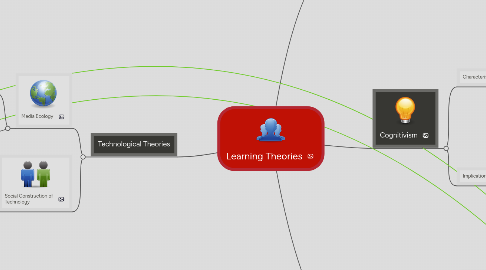
1. Technological Theories
1.1. Media Ecology
1.1.1. Characteristics
1.1.1.1. Media as an environment
1.1.1.2. Technology affects our view of the world
1.1.2. Implications for Teaching
1.1.2.1. This theory demonstrates how technology can become an integral part of teaching philosophy by how it affects our daily lives.
1.2. Social Construction of Technology
1.2.1. Characteristics
1.2.1.1. People shape technology
1.2.1.2. Technological success is determined by society, not quality.
1.2.2. Implications for Teaching
1.2.2.1. This theory shows us how we must pay careful consideration to the types of technology we use, and to the intended purpose.
2. Behaviorism
2.1. Characteristics
2.1.1. Learning is connected to Stimulus & Response
2.1.2. Stimulus/Response leads to cause and effect relationship.
2.1.3. Learning occurs best with repetitive practice
2.1.4. "Black Box" approach to learning.
2.2. Implications for Teaching
2.2.1. Supports repetitive drills and teaching practices.
2.2.2. Teacher directed learning style (The teacher provides the stimuli)
2.2.3. Traditional teaching practice.
3. Cognitivism
3.1. Characteristics
3.1.1. The brain is an information processor.
3.1.2. There are mental processes associated with various aspects of learning (Thinking, Remembering, ect.)
3.1.3. These processes, or cognitive strategies are used to transfer knowledge to individuals.
3.1.4. Students learn and remember different thinking processes.
3.2. Implications for Teaching
3.2.1. Teachers should teach thinking strategies as well as curriculum knowledge.
3.2.2. We can improve learning by improving how we think.
3.2.3. Departure from the "Black Box" model.
4. Constructivism
4.1. Characteristics
4.1.1. Processing knowledge is an active process.
4.1.2. Learners participate in the construction of their own knowledge.
4.1.3. Learning involves making discoveries and correcting a state of disequilibrium.
4.1.4. New knowledge can only be built on top of existing knowledge.
4.2. Implications for Teaching
4.2.1. Learning is an interactive and social process
4.2.2. Guiding and scaffolding are key in the development stages.
4.2.3. Acquisition of knowledge is both internal and external.
